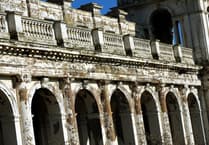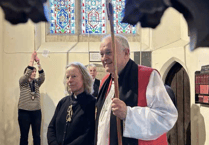This Saturday sees the much-anticipated coronation of King Charles III. This ultimate display of royal pomp and pageantry will be a first for many of us to experience live.
Like most of you, I have seen the early television images of the late Queen’s coronation more than 70 years ago, so it will be fascinating to see a 21st-century version of an occasion steeped in so much history.
As I type, various parts of the parliamentary estate are being closed off and prepared for the King’s procession through Westminster in a few days’ time. Thousands of service men and women are rehearsing for their important role in escorting the King and Queen as they make their way through the crowds, and details are being finalised for the carefully-choreographed constitutional ritual in Westminster Abbey.
Earlier this week I had the great privilege of seeing the King at an MPs’ reception in Westminster Hall to celebrate the coronation. He seemed remarkedly calm for a man about to take centre stage on a global stage.
Westminster Hall was a fitting place for this reception given the role it has played over the centuries in coronation ceremonies of Kings and Queens.
The earliest coronation banquet held at the Hall dates as far back as the coronation of Richard I in 1189, with the last banquet being held in 1821.
Alongside a great feast, the King’s Champion would traditionally ride in on horseback during the first course and throw down his gauntlet to defend the King against any challengers or doubters of the new monarch’s legitimacy.
Interestingly, the title of King’s Champion has been in the same family since the 14th century!
If we go back even further to 1066, a turbulent and violent time in our history which saw many individuals lay claim to the throne, a coronation ceremony was essential to fortify the position of the victor and secure the line of succession.
Now, while still constitutionally important and underpinned by the same religious solemnity, the need to settle warring factions has diminished, making the coronation much more of a symbolic and celebratory occasion.
Central to the coronation is the anointing of the monarch with holy oil or the ‘unction’. This is the moment at which the King becomes God’s chosen representative on Earth; divinely ordained. King Charles, like his mother before him, will undergo this very personal part of the service away from the glare of television cameras.
But in some ways we already know King Charles will be doing things slightly differently to his predecessor. Along with his pledge to defend all faiths, it has been reported the King is reusing historic chairs to make the event more sustainable and is distributing packets of wildflowers to primary school pupils across the country to create coronation meadows.
Aside from the meticulously designed ceremony and the curious traditions that can only arise from an occasion that’s more than 1,000 years old, we can all rejoice at the prospect of an extra bank holiday and the opportunity to get together with family, friends and neighbours.
I hope you can join in one of the many community events happening in East Hampshire this weekend. There are picnics in beautiful settings, street parties, fetes, church services, musical performances and tea dances.
What a lovely way to come together as a community and celebrate the reign of our new monarch.
I wish you all a wonderful coronation weekend and let’s hope the sun shines for us all too!




